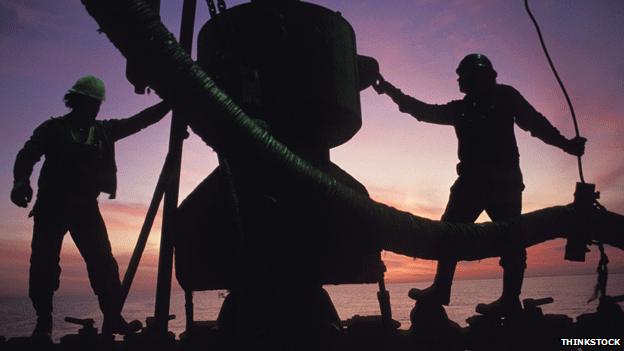Scottish independence: Nicola Sturgeon predicts Shetland oil boom
- Published
Scottish independence: Nicola Sturgeon targets floating voters
Shetland is on the cusp of a "second oil boom", the deputy first minister has predicted during a visit to the islands.
Nicola Sturgeon said Shetland had "shown the rest of Scotland the way" by setting up an oil fund in 1976.
And she claimed Scottish independence would help ensure islanders continued to benefit from its oil industry.
But former Orkney and Shetland MP Lord Wallace said the UK offered Scottish islands "the best of both worlds".
Both the Scottish and UK governments have recently set out their rival visions for how best to increase representation for Scotland's islands.
The UK government has proposed scrutinising legislation to ensure it takes account of island priorities, while it has also said an oil and gas forum would be set up in the event of a "No" vote to assist decision-making in the sector.
Overnight ferry
Meanwhile, the Scottish government proposals included giving island communities all money generated from leasing the seabed after independence, and setting up new "island innovation zones" to boost job opportunities.
As she made her way to Shetland for a visit ahead of next month's referendum, Ms Sturgeon held a town hall style meeting for passengers on the overnight ferry
Her trip came as the Yes Scotland campaign unveiled actor Douglas Henshall - star of the BBC's Shetland series - as a supporter of independence.


As part of our series of daily questions ahead of the independence referendum on 18 September, the BBC's James Cook examined the rival claims over how much oil remains in Scottish waters.
If you have a referendum question, let us know by....
Emailing newsonlinescotland@bbc.co.uk
We can also be found on Twitter @bbcscotlandnews
And on Facebook, external.

Speaking in Lerwick, Ms Sturgeon argued that a "No" vote would ensure Shetland's natural wealth "continues to flow to London", while a "Yes" vote would allow Shetland to "reap the benefits of a second energy bonanza".
She said: "Shetland is on the cusp of a second oil boom. Anyone who comes here can't miss the hundreds of workers coming on and off the islands and the impact all of this activity has on small island communities.
"Shetland showed the rest of Scotland the way when it established its oil fund in 1976. That charitable fund has grown to £200m and the investment it has made in Shetland communities is here for all to see.
"Independence means the rest of Scotland can take the same approach and invest in our future through a national energy fund, but it also means a new opportunity for Shetland communities to benefit from the industry off their shores."
"With 100% of revenues from the seabed - that currently go to Westminster - transferring directly to Shetland for the community to use there is an opportunity to continue that investment in community benefit."
Oil revenues remaining in Scotland after independence would allow the Scottish government to help meet some of the costs to Shetland of hosting the oil and gas industry, she said.
Campaign trail
And an energy forum would ensure Shetlanders would be given a "greater say in the industry for the first time in 40 years", she claimed, thanks to the creation of an energy forum.
Ms Sturgeon's visit to Shetland coincided with former Scottish First Minister Jack McConnell hitting the campaign trail in Inverness alongside Chief Secretary to the Treasury Danny Alexander and Lord Wallace, a former deputy first minister.
They said devolution had delivered for the Highlands and Islands, pointing to the creation of the University of the Highlands and Islands, new powers to support Gaelic, the creation of National Parks and the growth in creative and tourism industries as evidence.
Lord Wallace said all the major pro-UK parties were committed to delivering more powers to Scotland in the event of a "No" vote, and warned over the future of the defence industry in an independent Scotland.
He said: "With devolution we can have the best of both worlds.
"Powers which the Scottish Parliament can and has used to meet the distinctive needs and challenges of the Highlands and Islands; and benefiting from the broad shoulders of the UK to sustain a universal postal service to the remotest communities and supporting key industries such as whisky through the massive UK international trade network.
"This region has a long tradition serving the defence needs of the whole UK.
"It cannot make any sense for this area to back the break-up of the UK as that can only lead to a lesser role in defence in the future."